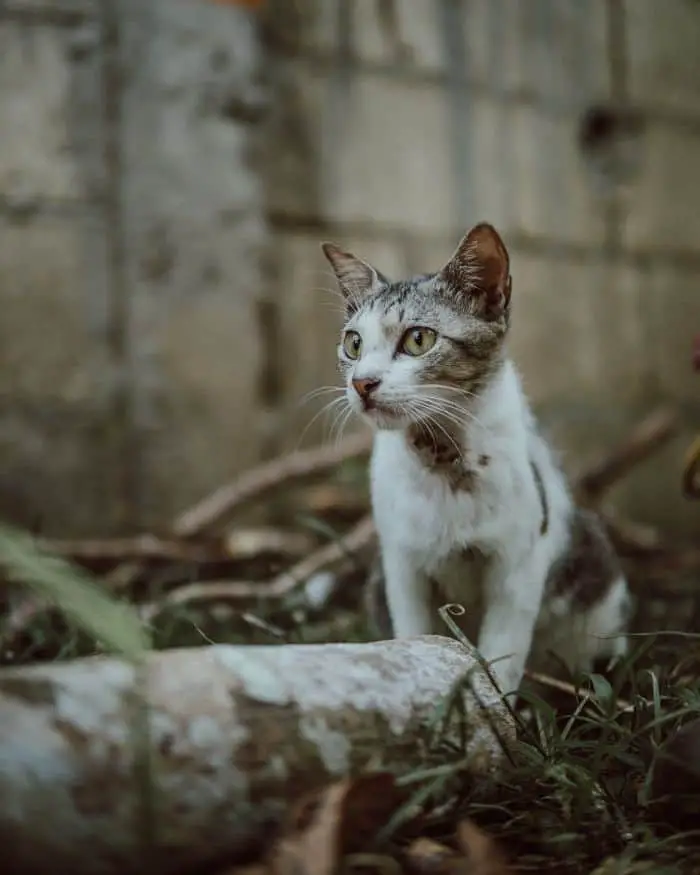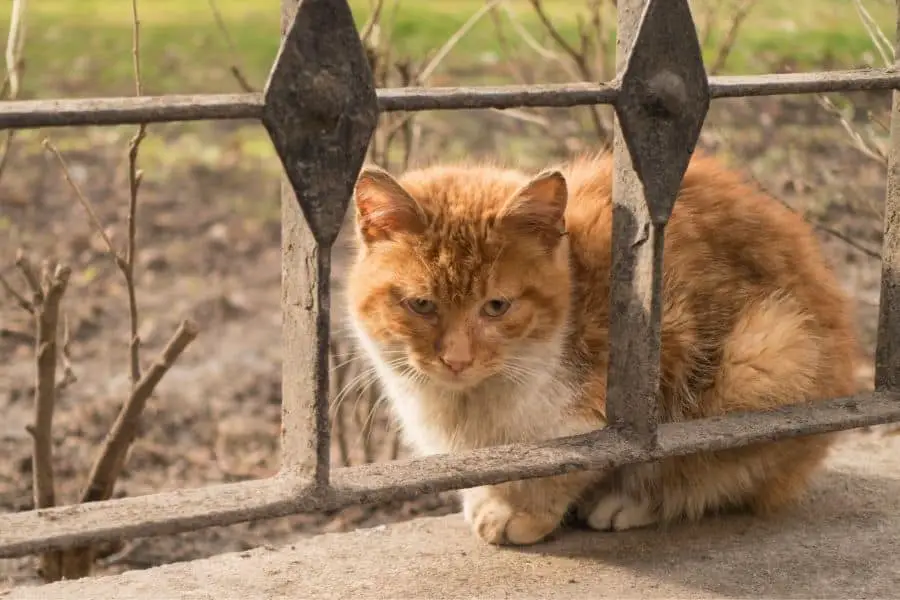More Meows is an Amazon Associate. As an Amazon Associate we earn from qualifying purchases. We may also earn commissions if you purchase products from other retailers after clicking on a link from our site.
It is no secret that your typical housecat is not only a carnivore but can be a cold-blooded killer. If a cat is happy and well-fed, killing other animals is more of a violent pastime than a means of obtaining food. However, what happens when they are hungry and fending for themselves?
Cat infanticide is not common amongst stray cats, but it does happen. Stray cats are wilder than domestic cats. When cats commit infanticide, they are usually trying to pull the mother out of lactation so that she becomes fertile sooner.
It is more likely that a male cat will kill kittens than a female cat, and it is usually within the first week of the kitten’s life. There seem to be several reasons why a fully grown cat will attack, kill, and sometimes even eat a small kitten, but all these reasons seem to hearken back to the old saying, “Survival of the fittest.”

Will Stray Cats Kill Kittens?
Stray cats may have more wild tendencies than domestic cats, but that doesn’t make all of them killers. Stray females feel just the same about their litter as any other cat. It is only under extremely specific circumstances that a cat, male or female, will kill a kitten.
Male and female cats can resort to violence, but not usually toward small kittens. Male cats always have other motives for killing kittens, and mother cats won’t kill their litter except under very stressful situations.
Stray Cat Aggressive Behavior
Unlike dogs, it can be hard to fully domesticate cats. The common housecat’s ancestors saw living near humans as a mutually beneficial relationship. Wherever the humans were and kept their food storage, there were bound to be small rodents or vermin for the cat to prey upon.
By nature, cats are not particularly social, and therefore do not want to need humans. Furthermore, if a house cat runs away, is abandoned, or for some other reason loses contact with humans for an extended period, it is pretty common for that feline to turn feral and begin seeing humans as a large predator.
It is also common for stray cats and semi-domesticated cats (house cats) to participate in homicide to pass the time. If their nutrition needs are being met, it is not uncommon for cats to kill for pleasure.
One study found that many cats, about 30 percent of those they watched, managed to capture and kill prey. Among those sampled cats, the average number of kills was around one in every 17 hours outdoors. Of course, these kills were just for the chase or honing their skills, and the cats did not eat this prey.
Why Would a Cat Kill a Kitten?
If stray cats live like their larger and more wild ancestors, then it would stand to reason that they would act in much the same way. It is in their DNA, right? Often, this sort of “the law of the jungle” mentality leads to a desire for self-preservation. Cats do not typically kill other cats and not kittens without a more deep-rooted reason.
| Reasons a Stray Cat Kills a Kitten | Male or Female Perpetrator |
| Male Infanticide | Male – reproductive benefits |
| Environmental conditions | Male and female – better resource access |
| Nutritional benefits | Male and female – self-preservation |
| Female Infanticide | Female – low likelihood that offspring will survive due to outside forces |
| Female kitten goes into a “false heat” | Male – misunderstanding and sexual frustration |
| Cannibalism | Female – redirected aggression. |
Most of these infanticide examples are more common in larger cats, but all can happen in any felines, like strays and feral cats.
Infanticide Reproductive Strategies
A few of the above potential threats are more likely than others. The most likely situation is that a male cat will kill a litter to pull the mother out of lactation and force her to become fertile again. This way, the male can then produce his offspring with the female.
In uncertain environments such as the wild, nothing is a guarantee and certainly not with reproduction. If a male can ensure that one or multiple females go into heat, he stands a much better chance of his offspring surviving to maturity.
Another aspect that should be considered is males’ likelihood to kill off male kittens, especially if the male does not share DNA with the kitten target. Baby kittens grow to be adult cats, and a male kitten could pose a potential threat to the adult male at some point down the line.
In these instances, the female almost always tries to prevent her kittens’ death, but if she is unsuccessful, she can go into heat in as short as 24 hours. It may seem shocking that a female cat would mate with the same male who killed her last litter, but it is quite common in the animal kingdom.

Access to Resources
The most common reason for infanticide between male and female cats alike is a natural struggle for resources. Whether it be finding enough food, water, or shelter to overcome the natural elements, having kittens can severely strain males and females.
When it comes to limited food available, you might wonder if stray cats could die of hunger. To learn more on if stray cats die of hunger: Click Here.
Males would much rather kill off a previous litter of their new, potential mate than struggle to provide for kittens that he did not sire. This way, his new litter with the mother has prime access to precious resources that otherwise may not have covered both. The male will control what he can to have his litter survive above any other.
Studies have shown that when a litter’s mother is under extreme environmental stress, her natural desires to survive can overcome her motherly instincts. This particularly seems to happen with the second litter of a female in one year. It puts a whole new perspective on looking out for number one!
With this same reasoning, and because cats are naturally highly mobile, inexperienced and unqualified individuals have no place doing anything to a litter of kittens from a stray animal, such as:
- Moving them
- Touching them
- Disturbing the litter
Mama cats have been suspected of killing off or neglect their infant brood if it has been disturbed by people.
Quality Over Quantity
An instance of kitten attacks that seems to fall more particularly on the mothers comes down to a question of life expectancy and survival rate. If the mother suspects that her kittens may not survive, the mother either allows the litter to go the way of all the earth naturally, or she will speed up the process and kill her young.
To learn more about stray cats and if they carry diseases, check out my article: Click Here.
Not all kittens are born healthy. Some have problems latching on, others are born with genetic mutations, and others are born too small or too sick to survive. In these cases, the mother would rather have precious resources go to kittens that have a better chance for survival. In the animal kingdom, this is fairly common across many mammals.
To learn more about rabies, a terrible disease that some stray cats can carry, check out my article to learn more: Click Here.
Mother cats have also been known to limit their litter size based on their ability to mother. Not all cats make good mothers. It is not common but possible for a female to become dissatisfied with her kits and then eliminate her litter to mate with a new partner.
Domestic Cat Infanticide
Domestic cats are even less likely to commit infanticide against kittens than stray cats. Domesticated cats, or house cats, usually don’t have a lot of access to other litters, and they don’t seem to have any of the same motives that stray cats would have in killing kittens.
The stresses stray mothers might face in the wild don’t translate to domesticated life, and therefore, cats in a home would have little to no reason to kill a kitten. Resources are plentiful in a human home, so unless the cat was under extreme stress or felt unsafe, it isn’t likely for the kittens to be in danger.
What do You do When You Find a Stray Kitten?
It is not usually necessary or wise to interact with a stray kitten. Some strays have had human contact, and therefore may not mind too much if you want to approach a litter, but many strays are feral and don’t want anything to do with humans. People look like large predators to strays, and if they feel threatened, the cat may want to attack.
If you find a solitary stray kitten crying out for help, it’s best to wait a little while and see if the mother is nearby or coming back. Sometimes stray cat mothers have to leave one or two kittens to find a new, safer place to live. Mother cats will come back to their litter if they can, so be patient.
When thinking about how stray cats interact, people sometimes wonder if stray cats can be affectionate. Find out more in my article on this subject: Click Here.
If it’s clear that the mother can’t isn’t going to come back, you might need to get involved or call the local animal shelter for advice. It’s worth mentioning that some wild cats will want nothing to do with their kits if a human interrupts the nest, so be careful before you jump right in.
If you start befriending a stray cat, you may wonder if stray cats get attached to one person. To learn more about this, check out my article: Click Here.

Final Thoughts
Different stressors influence different cats in different ways. What would be devastating and too much to bear for one animal is taken in stride with another creature. Although cats have been known to hunt both for food and pleasure, it is not common for a cat to kill kittens without underlying factors.
Environmental, social, and even individual stresses for stray cats can influence their instincts and sometimes lead to infanticide. Motherly instincts do run in feral cats, but not always at the risk of the mother’s livelihood.
It is important to remember that animals and especially feral animals, do not experience the same attachment level or emotion that humans do. The animal kingdom may seem cruel from the outside, but it proves to have little to do with coincidence when properly studied.
If you enjoyed this article, please check out a couple of others:
- Can Stray Cats Survive A Hurricane? The Revealing Ways: Click Here.
- Will Stray Cats Drink Antifreeze? Scary Info Here: Click Here.
